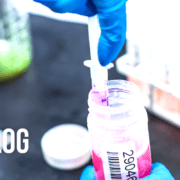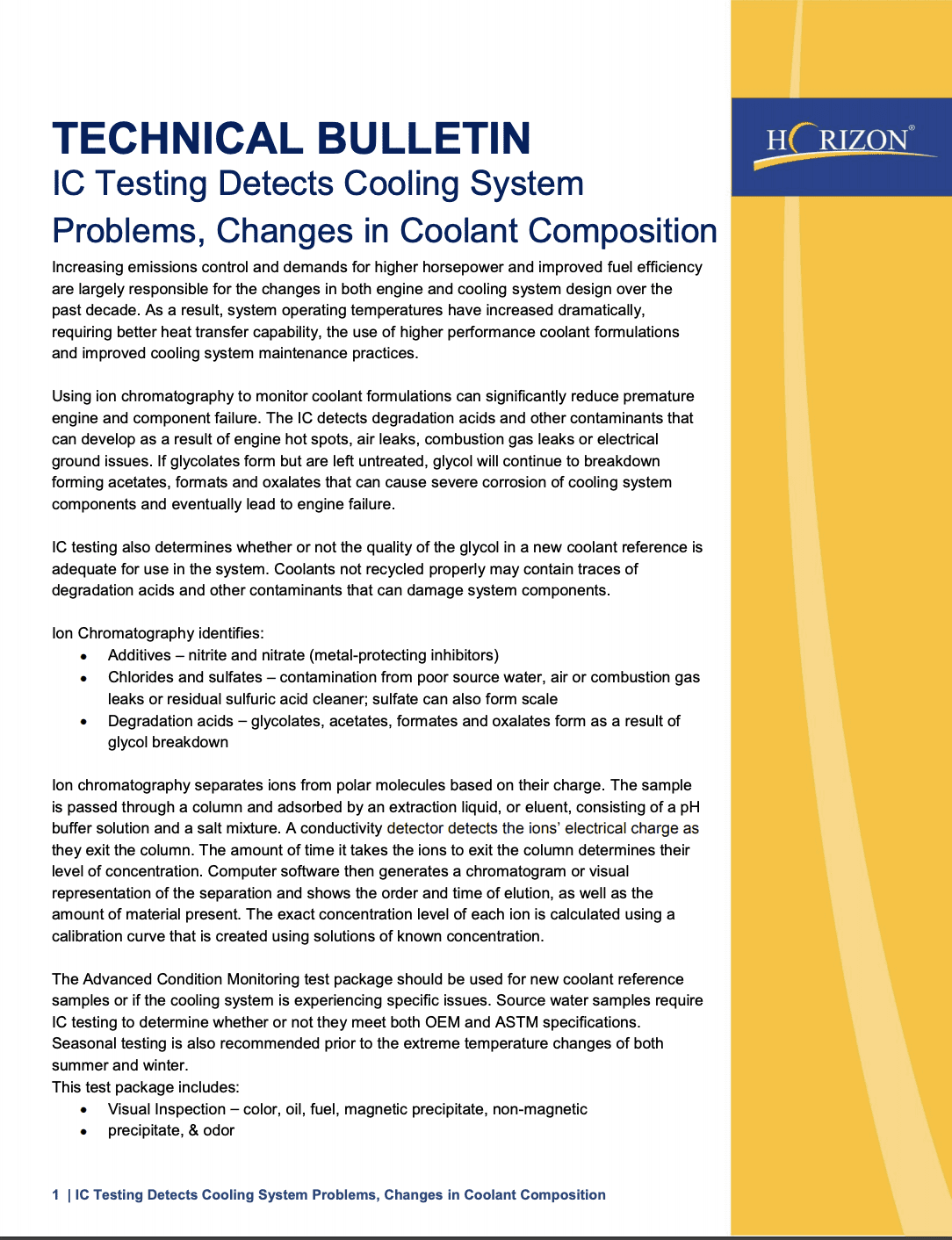Ion Chromatography Testing Can Catch Cooling System Concerns Early

Have you received a recurring action on your coolant analysis report? Are you noticing recurring concerns with your pH, corrosion metals, and/or inhibitor depleting rapidly? Have you ever topped off the system with water only?
With basic coolant testing a piece of the puzzle to help identify the root cause of the concern in the cooling system may be missing. Basic testing will identify concerns and provide recommendations however, there may still be more going on in the system that basic testing will not identify.
Why Should Advanced Ion Chromatography (IC) Coolant Testing Be Added?
The advanced Ion Chromatography (IC) testing will determine glycol degradation, contamination and coolant inhibitors of nitrate, nitrite and possibly phosphate. IC testing will provide additional valuable information regarding your cooling system health.
IC testing will help find concerns with:
- Hot spots (plugging of the system)
- Combustion gas leaks
- Electrical ground issues
- Contamination concerns
Each concern above will cause a chemical reaction within the cooling system, resulting in failure overtime. Approximately 40% of engine failures can be traced back to a concern in the cooling system. Including IC testing to your routine coolant analysis program will provide more information on what is going on in the cooling system. Concerns can be caught early allowing for scheduled down time and less engine failures due to the cooling system.
What are Glycol Degradation Acids?
Degradation acids will form when ethylene or propylene glycol chemically breakdown. When degradation acids are present further glycol breakdown will occur as the acids present will act similar to a catalyst causing further glycol degradation over time.
Causes for degradation acids:
- Localized overheating
- Restriction of coolant circulation
- Low coolant pressure
- Mechanical concerns
- Age of fluid
Degradation acids will hinder the coolant properties over time and may result in a decrease of the coolants ability to protect the metals in the system. Identifying the root cause is key to maintain the fluid and equipment.
What Contamination Concerns can be Found?
Ion Chromatography will indicate contamination of chloride and sulfate. Chloride and sulfate are a concern if present in the system. Chloride can form hydrochloric acid, decarbonizes iron and is extremely corrosive. Sulfate can form sulfuric acid and combined with calcium to form scale in the system.
Causes for contamination:
- Water source not meeting specification
- Combustion gases
- Air leak
- Flush water left in system
Sulfate, when trending with prior history, can find an early combustion gas leak concern in the cooling system before an action is indicated on your lubricant analysis report. The coolant analysis will actually catch the concern and action can be made before a significant amount of coolant can mix with the lubricant leading to further engine wear.
Chloride contamination could be due to a venting concern allowing outside air to enter the system. Both chloride and sulfate can be present in a water that does not meet specification. Just a quick top off with water can cause a failure over time.
Catching contamination early with Ion Chromatography testing will provide the proper actions needed to correct the source of contamination before corrosion and/or chemical reactions occur harming the metals in the engine.
Are there benefits of reporting Nitrite and Nitrate?
Nitrite and nitrate may or may not be part of the coolant formulation as a corrosion inhibitor. The Ion Chromatography method is a more accurate method to determine nitrite concentration. The inhibitor if present, should be maintained for proper corrosion protection. Results can find concerns of low inhibitor, or mixing if inhibitor levels are not consistent with a new fluid reference. Trending both inhibitor levels can detect early concerns of chemical reactions, such as an electrical ground issue where nitrite could convert to nitrate.
Reach out today! Add Ion Chromatography testing to your program.
Advanced coolant testing will provide more details of possible chemical reactions occurring in your equipment and/or finding the root concern of recurring high severities found during basic coolant testing. Trending results from IC will provide more information on the fluid and find possible mechanical concerns in the cooling system. Catching system concerns early will help keep the cooling system functioning correctly and reduce unscheduled down times increasing your return of investment.
Check out our Technical Bulletin to find out more information on how Ion Chromatography (IC) Testing works:

Proven Impact. Proven Uptime. Proven Savings.
Let us prove it to you.



